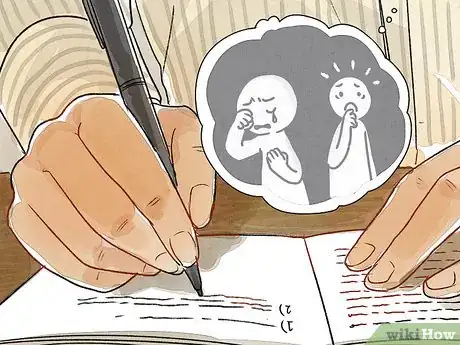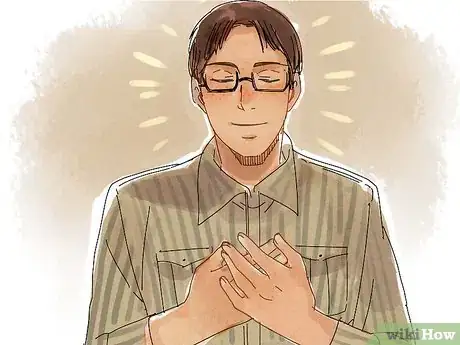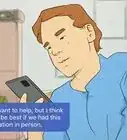This article was co-authored by Klare Heston, LCSW. Klare Heston is a Licensed Independent Clinical Social Worker based in Cleveland, Ohio. With experience in academic counseling and clinical supervision, Klare received her Master of Social Work from the Virginia Commonwealth University in 1983. She also holds a 2-Year Post-Graduate Certificate from the Gestalt Institute of Cleveland, as well as certification in Family Therapy, Supervision, Mediation, and Trauma Recovery and Treatment (EMDR).
There are 10 references cited in this article, which can be found at the bottom of the page.
This article has been viewed 74,743 times.
It’s normal to become emotionally invested in people you care about, but if you feel like you can't be happy without a certain person, you’ve crossed the line into emotional dependency. Emotional dependency can be difficult on you and on your relationships, but there are numerous ways in which you can reclaim your emotional independence. Our how-to guide will help you break out of that dependency so you can rebuild healthier relationships.
Steps
Expert Q&A
-
QuestionHow do you become more independent?
 Klare Heston, LCSWKlare Heston is a Licensed Independent Clinical Social Worker based in Cleveland, Ohio. With experience in academic counseling and clinical supervision, Klare received her Master of Social Work from the Virginia Commonwealth University in 1983. She also holds a 2-Year Post-Graduate Certificate from the Gestalt Institute of Cleveland, as well as certification in Family Therapy, Supervision, Mediation, and Trauma Recovery and Treatment (EMDR).
Klare Heston, LCSWKlare Heston is a Licensed Independent Clinical Social Worker based in Cleveland, Ohio. With experience in academic counseling and clinical supervision, Klare received her Master of Social Work from the Virginia Commonwealth University in 1983. She also holds a 2-Year Post-Graduate Certificate from the Gestalt Institute of Cleveland, as well as certification in Family Therapy, Supervision, Mediation, and Trauma Recovery and Treatment (EMDR).
Licensed Social Worker You can become more independent by spending some more time thinking about your life and situation before asking others for advice. You can also do some deep breathing, relaxation, visualization and/or journaling. Using affirmations can also help--for example, "I believe in myself."
You can become more independent by spending some more time thinking about your life and situation before asking others for advice. You can also do some deep breathing, relaxation, visualization and/or journaling. Using affirmations can also help--for example, "I believe in myself." -
QuestionWhat are the signs and symptoms of dependent personality disorder?
 Klare Heston, LCSWKlare Heston is a Licensed Independent Clinical Social Worker based in Cleveland, Ohio. With experience in academic counseling and clinical supervision, Klare received her Master of Social Work from the Virginia Commonwealth University in 1983. She also holds a 2-Year Post-Graduate Certificate from the Gestalt Institute of Cleveland, as well as certification in Family Therapy, Supervision, Mediation, and Trauma Recovery and Treatment (EMDR).
Klare Heston, LCSWKlare Heston is a Licensed Independent Clinical Social Worker based in Cleveland, Ohio. With experience in academic counseling and clinical supervision, Klare received her Master of Social Work from the Virginia Commonwealth University in 1983. She also holds a 2-Year Post-Graduate Certificate from the Gestalt Institute of Cleveland, as well as certification in Family Therapy, Supervision, Mediation, and Trauma Recovery and Treatment (EMDR).
Licensed Social Worker Dependent Personality Disorder goes beyond emotional dependency and represents an overall life orientation that has become entrenched. It is a mental disorder listed in the Diagnostic and Statistical Manual of Mental Disorders.
Dependent Personality Disorder goes beyond emotional dependency and represents an overall life orientation that has become entrenched. It is a mental disorder listed in the Diagnostic and Statistical Manual of Mental Disorders. -
QuestionWhat is an emotional dependency?
 Klare Heston, LCSWKlare Heston is a Licensed Independent Clinical Social Worker based in Cleveland, Ohio. With experience in academic counseling and clinical supervision, Klare received her Master of Social Work from the Virginia Commonwealth University in 1983. She also holds a 2-Year Post-Graduate Certificate from the Gestalt Institute of Cleveland, as well as certification in Family Therapy, Supervision, Mediation, and Trauma Recovery and Treatment (EMDR).
Klare Heston, LCSWKlare Heston is a Licensed Independent Clinical Social Worker based in Cleveland, Ohio. With experience in academic counseling and clinical supervision, Klare received her Master of Social Work from the Virginia Commonwealth University in 1983. She also holds a 2-Year Post-Graduate Certificate from the Gestalt Institute of Cleveland, as well as certification in Family Therapy, Supervision, Mediation, and Trauma Recovery and Treatment (EMDR).
Licensed Social Worker Emotional dependency is crossing the line from love or caring into needing the other person to sustain yourself. You lose your own boundary and merge yourself with the other person.
Emotional dependency is crossing the line from love or caring into needing the other person to sustain yourself. You lose your own boundary and merge yourself with the other person.
References
- ↑ https://www.psychologytoday.com/blog/romance-redux/201211/five-ways-overcome-feelings-neediness
- ↑ http://www.outofstress.com/emotional-dependence/
- ↑ http://www.harleytherapy.co.uk/counselling/7-ways-stronger-sense.htm
- ↑ http://tinybuddha.com/blog/let-go-of-control-how-to-learn-the-art-of-surrender/
- ↑ https://www.huffpost.com/entry/emotional-dependency_b_887144
- ↑ https://zenhabits.net/self-reliance/
- ↑ https://psychcentral.com/blog/archives/2011/10/30/6-tips-to-improve-your-self-esteem/
- ↑ https://www.fastcompany.com/3029765/how-to-set-goals-for-the-life-you-actually-want
- ↑ http://www.huffingtonpost.com/daylle-deanna-schwartz/if-you-want-a-healthy-relationship_b_4046354.html
About This Article
You can start working to overcome emotional dependency by learning to recognize and address your emotional needs. Instead of looking to others to make you feel a certain way, remind yourself that you are responsible for your emotions. For example, if you have a bad day, find a healthy way to make yourself feel better. You can go for a walk, write in a journal, or simply tell yourself that you are worth caring for. Keep reading to learn how giving to others can increase your sense of dependability.








































































